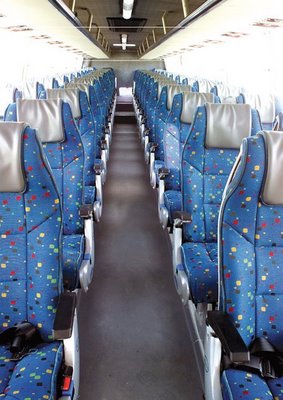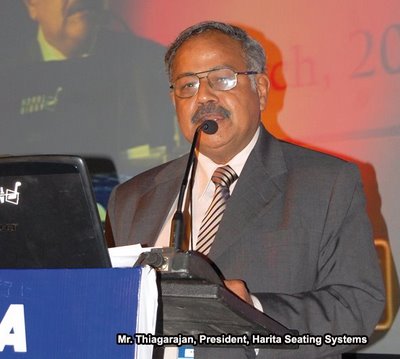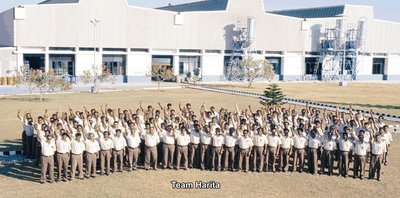
Harita Seating Systems specializes in manufacture & supply of seats for various types of vehicles. The company provides seating solutions to commercial vehicles, buses/coaches, agriculture tractors, construction machinery, two and three-wheelers, cars and multi-utility vehicles. The company has established leadership in the Indian market with years of experience in design, development and manufacture of these vehicle seats.
Starting off in 1986 as a joint venture between the TVS Family and Grammer AG of Germany. Harita Grammer had made big strides by developing state-of-the art seating systems to suit Indian road conditions. In two decades, pioneering work in R&D; has been done, international quality standards have been established and true to TVS tradition, its customers have quickly grown to expect only world class, customized solutions, from Harita.
Harita Seating Systems Ltd. has three manufacturing locations in India. The headquarter is located at Hosur. It has established manufacturing facility at Ranjangaon (near Pune) to cater to the needs of customers in Western India. Another major unit is at Nalagarh (Himachal Pradesh) for its business improvement in the Northern area. In 2007-08 the company achieved turnover close to Rs. 200 crores. In an interview to MOTORINDIA, Mr. Thiagarajan, President, Harita Seating Systems, said that the company is targeting a turnover of Rs. 500 crores in the next few years with the introduction of new products and would also be entering segments in which the company is not present now. To achieve this ambitious target the company has signed a few joint ventures, MoUs and made some acquisitions and has also entered into new product lines.
In an interview to MOTORINDIA, Mr. Thiagarajan, President, Harita Seating Systems, said that the company is targeting a turnover of Rs. 500 crores in the next few years with the introduction of new products and would also be entering segments in which the company is not present now. To achieve this ambitious target the company has signed a few joint ventures, MoUs and made some acquisitions and has also entered into new product lines.
Acquisition of Polyflex
The next major development is the acquisition of Polyflex, a leading manufacturer of polyurethane cushions for seat manufacturers. This acquisition will give Harita an entry into passenger car segment through Tier-1 companies. Polyflex supplies polyurethane foam for seats to Tata Johnson, in Pune and Chennai, and Dymos India (formerly known as Hanil Lear) in Chennai, Lear in Nashik and Toyota Boshoku in Bangalore. It is a Tier-2 supplier to Tata Motors, Ford, Hyundai, Toyota and Mahindra-Renault. Polyflex has manufacturing plants in Bangalore, Chennai and Pune. Besides, it also has a fabrication unit called Polyflex Engineering in Bangalore.
Harita has acquired Polyflex plants in Bangalore and Chennai and the movable assets of Polyflex’s Pune plant. It is also taking over Polyflex Engineering. The plan is to integrate Polyflex under Harita Fehrer in the future, adds Mr. Thiagarajan. Harita hopes that this JV with Fehrer and the acquisition of Polyflex will provide the much needed entry into the passenger car seating business in which currently the company has very limited presence.
Joint venture with Fehrer
In 2008, Harita signed an MoU for a joint venture with F.S. Fehrer Automotive GmbH, a leading German manufacturer of seats and interior components. The joint venture Harita-Fehrer Ltd. will have Harita holding 51 per cent and Fehrer 49 per cent. The production program of the joint venture includes polyurethane moulded foam pads for seats and plastic components for the Indian automotive market as well as two-wheeler seats. For the near future, the partner companies plan to expand the capacities for the seat bolster production and extend the product portfolio by armrests and headrests for the Indian automotive market.
LFI moulded components
From seats, Harita is looking at a related diversification. The company has invested in the manufacture of new technology products like micro cellular urethane products and long fibre injection moulded components for automotive applications. These have been well received by customers and pilot supplies were effected, says Mr. Thiagarajan.
The first product which has been developed and commercialised under the LFI technology is the front hood for the new Same Deutz Fahr tractors which are being manufactured at Ranipet. The covers are made of fibre-reinforced PUR in a LFI process and are given a high-gloss surface finish in the mould. Harita is one of the world’s first PUR processor to use this technique in series production. The LFI process differs from other PUR processes in that the long glass reinforcing fibres are wetted with the PUR in the mixing head.
The company is talking to various OEMs and indentifying applications which will be ideally suited for using LFI technology. “Being a new technology, we expect longer lead time for the markets to evaluate and accept these products in a big way”, adds Mr. Thiagarajan.
Harita has invested Rs. 15 crores in setting up a very advanced facility for manufacturing these products. In its existing range, the company has upgraded driver seats for heavy commercial vehicles and construction equipment to meet the AIS 023 regulations of the Government and has already commenced supplies to OE customers successfully. Besides, the company also developed and productionised seat components for export markets and introduced variants of existing bus passenger seat models to meet customer requirements. Harita has installed capacity to manufacture 3.5 million seats. It caters to all segments of the automotive industry. The company has a long list of OEMs to across all segments, including Tata Motors, Ashok Leyland in the commercial vehicle segment, TVS Motors, Yamaha and Royal Enfield in the two-wheeler segment, Reva and ICML in the passenger car segment, and TAFE, John Deere, Mahindra and Fiat CNH in the tractor segment. In the bus segment, the company is the most preferred supplier to Volvo, Tata Motors and Ashok Leyland and the recently launched Mercedes. Harita caters to 100 per cent of Volvo’s requirement in India.
Harita has installed capacity to manufacture 3.5 million seats. It caters to all segments of the automotive industry. The company has a long list of OEMs to across all segments, including Tata Motors, Ashok Leyland in the commercial vehicle segment, TVS Motors, Yamaha and Royal Enfield in the two-wheeler segment, Reva and ICML in the passenger car segment, and TAFE, John Deere, Mahindra and Fiat CNH in the tractor segment. In the bus segment, the company is the most preferred supplier to Volvo, Tata Motors and Ashok Leyland and the recently launched Mercedes. Harita caters to 100 per cent of Volvo’s requirement in India.
All major State transport corporations like KSRTC, APSRTC, MTC and BMTC are customers of Harita. Most importantly, bus body builders like SMKannappa, Jaico and Veera extensively use Harita seats.
Recent years has also witnessed another phenomenon of public sector transport undertakings launching low floor city buses, upgradation of existing fleet and induction of high end buses for long distance travelling. Upgradation of urban bus fleet and introduction of deluxe/ultra deluxe buses by state transport corporations as well as high-end long distance buses by the private operators offers yet another scope for increase in volume of bus passenger and driver seats. This has helped the company with greater opportunities in the high end bus passenger segment.
With the JNNURM order for 15,000 new city buses and an additional 40,000 buses which will replace the over aged buses, Harita is looking forward to a significant share of business in the bus segment. Harita has
supplied seats for the 655 low floor city buses supplied by Tata Motors to DTC.
Tractor seats is one of the important segment for Harita where the company enjoys a leadership position. The company is now focusing on export market and is committed to meet customer requirements in terms of quality, cost, delivery and service. Currently less than 10 per cent of the turnover comes from exports and the target is in the next 5 years exports would account for 20 per cent of the total turnover.
Harita is certified for TS 16949, ISO 14001, OHSAS 18001.The company has successfully adopted TQM practices across all its plants and has won many awards and accolades.